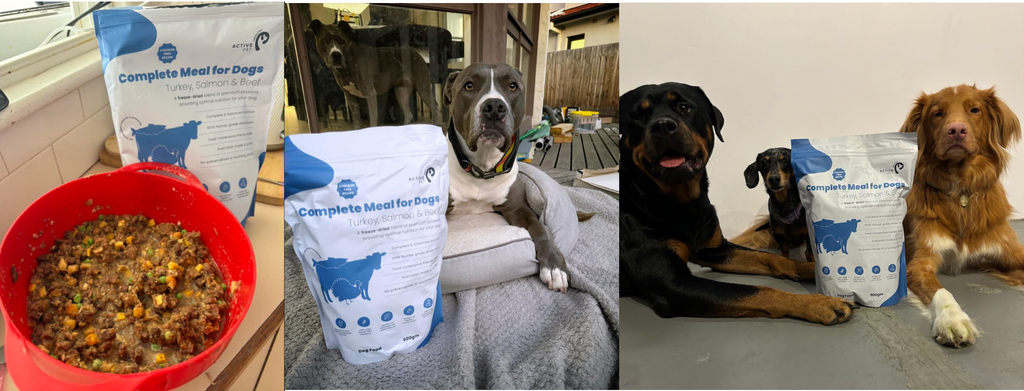
How to help your dog lose weight
One of the best things we can do for our dogs, is to ensure they are at and maintain a healthy weight.
According to The Association for Pet Obesity Prevention, 56% of dogs are overweight.
Studies have also proven that of those dogs considered obese, 93% of their pet parents thought their dogs were a normal weight.

As a society, have moved into more sedentary lifestyles – especially during the pandemic—and many dogs now struggle with weight issues.
Overweight dogs – what studies have proven
The same study found that 42% of pet parents did not know what a dog’s healthy weight looked like. You can find this out for your dog here
Some dog breeds are more prone to obesity. These breeds are predisposed to weight problems, but all dogs can suffer from obesity for a variety of reasons not related to their breeds.
Causes of obesity in dogs are:
- Age – dogs become less active as they age
- Breed or genetics
- Spaying or neutering
- Overfeeding – inconsistent amounts or free-choice feeding
- Lack of exercise
- Sex – spayed female dogs are prone to weight issues
Overweight or obese dogs can have serious health issues. Let’s look at some of those health risks.

Health risks for overweight and obese dogs
- Reduced lifespan: Studies have shown dogs that are lean can live 15% longer than overweight dogs. So a dog with a 12-year lifespan, at an ideal weight, could extend their life by 1.8 years (under good circumstances) more than an overweight dog.
- Osteoarthritis: Joint problems are prevalent with large dog breeds. Excess weight adds an increased burden to the joints. If an overweight dog loses weight, there is increased mobility and less weight on the joints, both of which reduce pain.
- Respiratory diseases: Brachycephalic dogs (flat-faced dogs like pugs, bulldogs, pekinese) can develop Brachycephalic Obstructive Airway Syndrome (BOAS), an uncomfortable breathing condition that needs supportive veterinary care. Obesity can exacerbate this condition.
- Dogs diagnosed with a collapsed trachea can experience worsening symptoms from excess weight. Their symptoms can improve when they lose the extra weight.
- Overweight dogs may recover slower from surgery.
- Metabolic effects: When there are increased levels of fat in your dog’s blood, it affects blood sugar levels. This can be a problem for a diabetic dog. However, studies have shown that obesity does not cause type 2 Diabetes mellitus in dogs like it can be for humans or cats, however, being overweight can increase issues for those dogs with the disease.
- Heat intolerance: Dogs who are overweight are more likely to suffer from heat illnesses. Fat cells provide increased insulation in a dog’s body. Even mild exercise creates extra heat inside your dog’s body making outside influences like high temperatures worse.
- Skin disease: Overweight dogs may develop fungus or yeast in the folds of their skin. They also have less healthy skin and coats than normal-weight dogs.
- Decreased activity: An overweight dog may not care to go on brisk walks or run around the yard as readily as it did prior to the weight.
- Puppies that are obese or overweight can have long term metabolic effects, making it harder for them to lose weight as an adult. They are also at risk for developmental orthopedic diseases that cause structural weaknesses in their bones and cartilage as they grow. These weaknesses set them up for impaired movement and arthritis at later ages. At 8 weeks, puppies should have round little tummies and waddle a bit; but at 12-16 weeks, they should score the same on the Body Condition Score chart as adults.
- Obesity is associated with increased risk of some cancers, including mast cell tumors, breast cancer, and bladder cancer.
Body Condition Scoring: Is your dog overweight?
The first step we recommend is to use a body condition chart to determine if your dog is a healthy weight, like the one below.
This will give you an idea of how much work you have ahead of you, and it will help you document your progress .
Before embarking on any weight loss journey for your dog, it’s important to have a thorough check up at the vet to make sure there aren’t any underlying health problems causing your pet’s weight gain, such as an under active thyroid.
Most dogs will be completely fine to follow the exercise guidelines in our dog food recipes and meal plan, but it’s a good idea to check with your vet what an appropriate amount of exercise is for your dog if they are a bit older or have any health conditions, like arthritis.

Unfortunately, not all vets are well versed in fresh food diets and aren’t always supportive of home cooking . This is a complex topic that relates to both the risks of poorly formulated homemade recipes, and the influence of “big pet food.”
At Healthy Active Pet, if your dog does need to lose weight, our expert team have created a Weight Loss Program to make it easier to lose weight.
We also have a range of air dried and freeze dried dog food that is ideal for weight management and you can see it here

All Healthy Active Pet recipes have been formulated to meet the same standards commercial pet food in Australia is generally formulated to meet (the AAFCO standards), which will hopefully alleviate any concern.
The program is focused on health and nutrition and will help your dog be in their best health possible. View the program here
If not, finding a vet that supports fresh foods is a helpful step to successfully implementing this meal plan, as they can encourage and guide you, building your confidence and supporting you and your dog on their journey
to wellness.
How can I help my dog lose weight?
If you suspect your dog is overweight, or even obese, and there are no underlying medical conditions, the rule of weight loss is the same for dogs as for humans: reduce calorie intake and increase calorie burn with exercise.
In order for your dog to tap into stored excess fat for energy use, they need to consume fewer calories than they require for not only exercise, but also the energy the body requires to function for digestion, making hormones, cellular repair, brain function, and the heart to beat.
Our Weight Management program is designed designed by animal nutritionists and behaviour experts to help your dog reach their optimal weight and maintain the best health possible.
You will also learn about the best way to feed and exercise your dog.

Our Dog Weight Loss Recipe Program is a 55 page program designed to get your dog in their best health possible and lose the excess kilos and promote their longevity
We will educate you, empower you and inform you.
It contains a full 4 week program designed by our pet nutritionists and experts.
The program includes home made fresh recipes and exercises to follow that are designed to help your dog reach their optimal weight.
- Healthy Active Pet makes home cooking for dogs easy, safe - and tasty
- Created by pet nutritionists for excellent nutrition & result
- Includes recipes & meal plans for dog performance & nutrition
- Easy home-cooking recipes, personalised for your dog, plus feeding guide
- All recipes have been formulated to meet the AAFCO standards
By following this program your dog will in their best health and you will also learn about the best way to feed your dog to ensure their receive the best nutrition possible for them
And if you are looking for a weight loss friendly food - check out our air dried turkey and sardine complete meal which is low calorie, high protein and a weight management food




